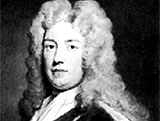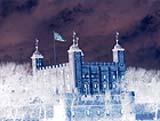Sir Robert Walpole 1721-1742 Whig
(单词翻译:单击)

Born: 26 August 1676 in Houghton, Norfolk
First entered Parliament: 11 Jan 1701
Age he became PM: 44 years, 107 days
Maiden1 speech: His first recorded speech in the House of Commons was on 24 Jan 1704 on the rights of electors
Total time as PM: 20 years, 314 days
Died: 18 March 1745 in Arlington Street, London
Facts and figures
Nicknames: "Sir Blustering2" and "Screen-Master General"
Education: Eton and King's College, Cambridge
Family: Robert Walpole was the fifth born of 17 children, eight of whom died when they were very young. He was married twice (to Catherine Shorter and then Maria Skerrett) and had three sons.
Interests: Collecting paintings, brewing3 beer, hunting and beagling
Biography
The first-ever PM
Today regarded as the first British prime minister, Walpole would not have described himself as such. The title was originally a term of abuse, not status, and was not officially recognised until 1905.
Walpole did, however, have many of the responsibilities and duties of the modern office of prime minister. He gave the position of chief political minister new authority by winning the support of both King and Parliament. Walpole was also the first to live and work in 10 Downing Street.
He was a large man, with a direct and earthy manner, a colourful personality and a brilliant mind.
The third son of a family of seventeen, he was educated at Eton and Cambridge, and inherited a country estate aged4 24.
With this wealth he gained the financial independence necessary to enter politics at the time.
In 1701 he became the Whig member of Parliament for Castle Rising, Norfolk. He proved himself an excellent speaker, and rose rapidly within the party. He was made a member of the Admiralty Board, Secretary of War and, in 1709, Treasurer5 of the Navy.
There was a small setback6 in 1712, when the Whigs were in Opposition7 again.
 The ruling Tories had Walpole tried for accepting an illegal payment as Secretary of War. Found guilty, he spent six months imprisoned8 in the Tower of London.
The ruling Tories had Walpole tried for accepting an illegal payment as Secretary of War. Found guilty, he spent six months imprisoned8 in the Tower of London.
Despite this, when the Whigs regained9 power, Walpole quickly rose to the positions of First Lord of theTreasury and Chancellor11 of the Exchequer12. Walpole resigned amid party infighting in 1717, splitting the Whigs in Parliament, but in 1720 returned to the government as Paymaster General.
South Sea Bubble
Walpole's career benefited from a government crisis in 1721, when thousands of people lost large amounts of money after the collapse13 of an investment scheme known as the South Sea Bubble.
Having bailed14 out early, Walpole was credited with financial know-how15.
Appointed as Chancellor of the Exchequer and First Lord of the Treasury10 for a second time, Walpole's powers as prime minister date from this point. Walpole was quickly successful, neutralising dangerous opponents, reducing the national debt and stabilising prices and wages.
His great influence stemmed from his popularity with both King and people. He realised the importance of a closely involved, active role in the Commons to consolidate16 this power.
It was also alleged17 that he effectively used bribery18 and corruption19 to retain the power he so relished20.
After George I's death in 1727, Walpole was briefly21 superseded22 by King George II's favourite, Spencer Compton. He succeeded in returning to prominence23 by buttering up the King, and by consistently going further than Compton's own attempts at sycophancy24.
King George II, now won round to Walpole, made his prime minister a gift of 10 Downing Street, where he moved in 1735.
Poor performance
In 1739 Walpole's poor performance in a war against Spain reduced confidence in his ability to carry out his duties. A poor general election result in 1741 made his position even more precarious25.
Walpole was forced to resign as prime minister in 1742, and was elevated to the House of Lords. An enquiry was launched into the distribution of secret service money under his premiership, alleging26 corruption.
Fortunately for Walpole, the matter was never pursued. Poor health forced Walpole to retire in 1744, and he died in March 1745.
It is said that he had 'a vulgar love of expense, without any true notions of magnificence; that he collected pictures, at immense cost, without either taste or love for the arts.'
Quote Unquote
To the Earl of Bath on their elevation27 to the House of Lords:
"My Lord Bath, you and I are now as insignificant28 men as any in England."
Did you know?
Walpole still holds the record for the longest term of any prime minister in history.
First wife - Catherine Shorter
 Walpole was twice married. His first wife was a merchant's daughter from Kent, who bore him five children.
Walpole was twice married. His first wife was a merchant's daughter from Kent, who bore him five children.
She enjoyed extravagance, frequently attending the opera and buying expensive clothes and jewellery.
During his time as prime minister Walpole grew estranged29 from his Wife and took a succession of lovers. Within a year of Lady Walpole dying in 1737, Walpole married one of them.
Second wife - Maria Skerett
Nearly 26 years his junior, Maria Skerett was witty30 and beautiful. She died after having a miscarriage31 in 1738, a bitter blow to Walpole.
 收听单词发音
收听单词发音
1
maiden

|
|
| n.少女,处女;adj.未婚的,纯洁的,无经验的 | |
参考例句: |
|
|
|
2
blustering

|
|
| adj.狂风大作的,狂暴的v.外强中干的威吓( bluster的现在分词 );咆哮;(风)呼啸;狂吹 | |
参考例句: |
|
|
|
3
brewing

|
|
| n. 酿造, 一次酿造的量 动词brew的现在分词形式 | |
参考例句: |
|
|
|
4
aged

|
|
| adj.年老的,陈年的 | |
参考例句: |
|
|
|
5
treasurer

|
|
| n.司库,财务主管 | |
参考例句: |
|
|
|
6
setback

|
|
| n.退步,挫折,挫败 | |
参考例句: |
|
|
|
7
opposition

|
|
| n.反对,敌对 | |
参考例句: |
|
|
|
8
imprisoned

|
|
| 下狱,监禁( imprison的过去式和过去分词 ) | |
参考例句: |
|
|
|
9
regained

|
|
| 复得( regain的过去式和过去分词 ); 赢回; 重回; 复至某地 | |
参考例句: |
|
|
|
10
treasury

|
|
| n.宝库;国库,金库;文库 | |
参考例句: |
|
|
|
11
chancellor

|
|
| n.(英)大臣;法官;(德、奥)总理;大学校长 | |
参考例句: |
|
|
|
12
exchequer

|
|
| n.财政部;国库 | |
参考例句: |
|
|
|
13
collapse

|
|
| vi.累倒;昏倒;倒塌;塌陷 | |
参考例句: |
|
|
|
14
bailed

|
|
| 保释,帮助脱离困境( bail的过去式和过去分词 ) | |
参考例句: |
|
|
|
15
know-how

|
|
| n.知识;技术;诀窍 | |
参考例句: |
|
|
|
16
consolidate

|
|
| v.使加固,使加强;(把...)联为一体,合并 | |
参考例句: |
|
|
|
17
alleged

|
|
| a.被指控的,嫌疑的 | |
参考例句: |
|
|
|
18
bribery

|
|
| n.贿络行为,行贿,受贿 | |
参考例句: |
|
|
|
19
corruption

|
|
| n.腐败,堕落,贪污 | |
参考例句: |
|
|
|
20
relished

|
|
| v.欣赏( relish的过去式和过去分词 );从…获得乐趣;渴望 | |
参考例句: |
|
|
|
21
briefly

|
|
| adv.简单地,简短地 | |
参考例句: |
|
|
|
22
superseded

|
|
| [医]被代替的,废弃的 | |
参考例句: |
|
|
|
23
prominence

|
|
| n.突出;显著;杰出;重要 | |
参考例句: |
|
|
|
24
sycophancy

|
|
| n.拍马屁,奉承,谄媚;吮痈舐痔 | |
参考例句: |
|
|
|
25
precarious

|
|
| adj.不安定的,靠不住的;根据不足的 | |
参考例句: |
|
|
|
26
alleging

|
|
| 断言,宣称,辩解( allege的现在分词 ) | |
参考例句: |
|
|
|
27
elevation

|
|
| n.高度;海拔;高地;上升;提高 | |
参考例句: |
|
|
|
28
insignificant

|
|
| adj.无关紧要的,可忽略的,无意义的 | |
参考例句: |
|
|
|
29
estranged

|
|
| adj.疏远的,分离的 | |
参考例句: |
|
|
|
30
witty

|
|
| adj.机智的,风趣的 | |
参考例句: |
|
|
|
31
miscarriage

|
|
| n.失败,未达到预期的结果;流产 | |
参考例句: |
|
|
|
- 上一篇:没有了
- 下一篇:Spencer Compton, Earl of Wilmington 1742-3 Whig




